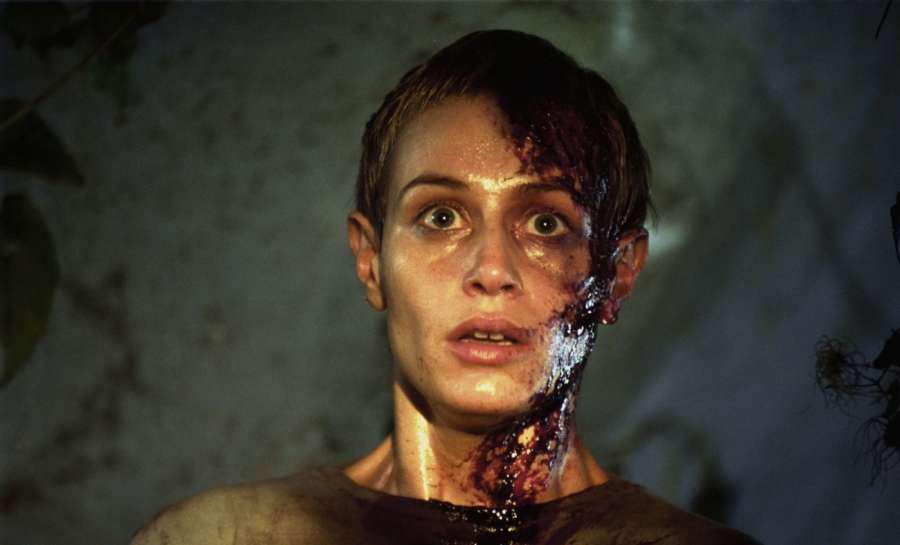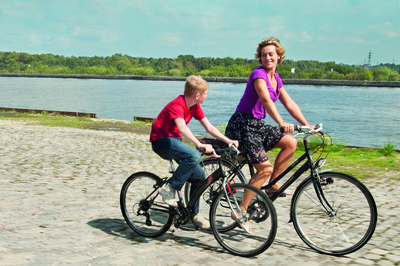 Kurt here. In The Kid with a Bike, the near-immaculate latest from the Brothers Dardenne, 11-year-old Cyril (Thomas Doret) is constantly on the move, chasing any possible shred of the father (Jérémie Renier) who recently dumped him in a Belgian orphanage and sold the family's belongings (including Cyril's precious bicycle) to pursue his culinary goals. It doesn't take long for Cyril to reclaim the bike, as it makes its way back to him thanks to the efforts of Samantha (Cécile de France) a kindly stranger Cyril literally latches onto during one of many attempts to escape his current guardians. Getting his father back, however, proves much less feasible, and Cyril's aching, at-all-costs need for paternal love and acceptance is what makes this sublime movie hurt so good.
Kurt here. In The Kid with a Bike, the near-immaculate latest from the Brothers Dardenne, 11-year-old Cyril (Thomas Doret) is constantly on the move, chasing any possible shred of the father (Jérémie Renier) who recently dumped him in a Belgian orphanage and sold the family's belongings (including Cyril's precious bicycle) to pursue his culinary goals. It doesn't take long for Cyril to reclaim the bike, as it makes its way back to him thanks to the efforts of Samantha (Cécile de France) a kindly stranger Cyril literally latches onto during one of many attempts to escape his current guardians. Getting his father back, however, proves much less feasible, and Cyril's aching, at-all-costs need for paternal love and acceptance is what makes this sublime movie hurt so good.
Cyril's fervent drive also provides the film with a surprisingly brisk pace, ultimately aided further by a concise running time of 87 minutes. Even when he starts spending relatively quiet weekends with Samantha (who, without any explanation other than de France's actions and expressions, eagerly steps into a motherly role), the boy is never without telling, tireless propulsion. He and Samantha eventually find his father, and after a tedious attempt to get themselves noticed at the estranged man's workplace (a fortress-like eatery and the setting for a grating game of so-close-yet-so-far-away), Cyril gets a few moments with him that just kill you. Astutely filmed in one uninterrupted take, there's a kitchen scene that sees Cyril insist upon giving his dad a pass for every wrongdoing, and insist even more upon connecting with him in any possible way. He practically forces his dad to jot down a cellphone number, then squeezes in to help stir sauce while the father wants nothing but to get Cyril out of his way.
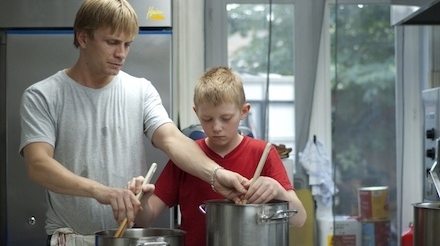
As they have surely been known to do, Jean-Pierre and Luc Dardenne exhibit an extraordinary grasp of youthful mindsets and sensations, from the thrill of popping a wheelie to the willful romanticizing of adults. The extent of the realism with which they are able to express Cyril's feelings is such that, at one very alarming point, I was brought directly back to a darker stage of my adolescence, specifically a Friday night when I knocked my father halfway down the stairs so I could leave the house. The confused rage of a child is not something easily articulated, but the Dardennes make it look easy. They also bring a youthful, crayon-box palette to the look of the film, effortlessly joining blue walls and yellow hallways and brightly-colored buses and parks with costume design that's defined by single-hued T-shirts (Cyril's red top is practically the movie's emblem). In the subtlest of ways, it's the cinematic equivalent of color-blocking, and it's just effective enough to be thematically supportive without force or pretense.
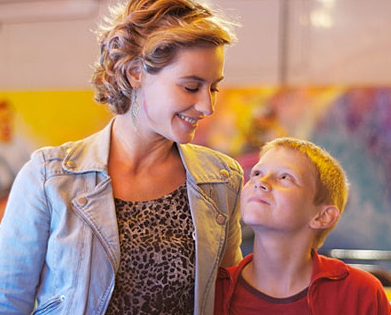 Amid being repeatedly shunned by his father, and systematically let down by another male authority figure – a local gang leader – whose surrogate approval he blindly seeks to the point of criminal acts, Cyril clings to his bicycle, a symbol of his parental and familial ideals that he must repeatedly retrieve from thieves (yes, Bicycle Thieves is evoked, but surely not for reasons so literal). Much of the story's emotional truth is made to work because of the stellar central performance from first-time actor Doret, who, along with Brad Pitt, Michael Shannon and Michael Fassbender, will likely make my personal Best Actor shortlist. With young skin and old eyes, this ridiculously naturalistic kid puts forth the ideal blend of the unexperienced and the weary, and he shows about as much consciousness of the camera's gaze as Cyril's father does of his son's existence. I won't tell you that The Kid with a Bike rides to a place of improvised-family acceptance, as that would grossly undersell it as something run of the mill. Instead, I'll say it ends on a note as perfect as Cyril could hope for, with an almost magical reassurance that the love he stumbled upon, and not the love he hopelessly pursued, is indeed his salvation.
Amid being repeatedly shunned by his father, and systematically let down by another male authority figure – a local gang leader – whose surrogate approval he blindly seeks to the point of criminal acts, Cyril clings to his bicycle, a symbol of his parental and familial ideals that he must repeatedly retrieve from thieves (yes, Bicycle Thieves is evoked, but surely not for reasons so literal). Much of the story's emotional truth is made to work because of the stellar central performance from first-time actor Doret, who, along with Brad Pitt, Michael Shannon and Michael Fassbender, will likely make my personal Best Actor shortlist. With young skin and old eyes, this ridiculously naturalistic kid puts forth the ideal blend of the unexperienced and the weary, and he shows about as much consciousness of the camera's gaze as Cyril's father does of his son's existence. I won't tell you that The Kid with a Bike rides to a place of improvised-family acceptance, as that would grossly undersell it as something run of the mill. Instead, I'll say it ends on a note as perfect as Cyril could hope for, with an almost magical reassurance that the love he stumbled upon, and not the love he hopelessly pursued, is indeed his salvation.
 Tuesday, January 8, 2013 at 3:00PM
Tuesday, January 8, 2013 at 3:00PM 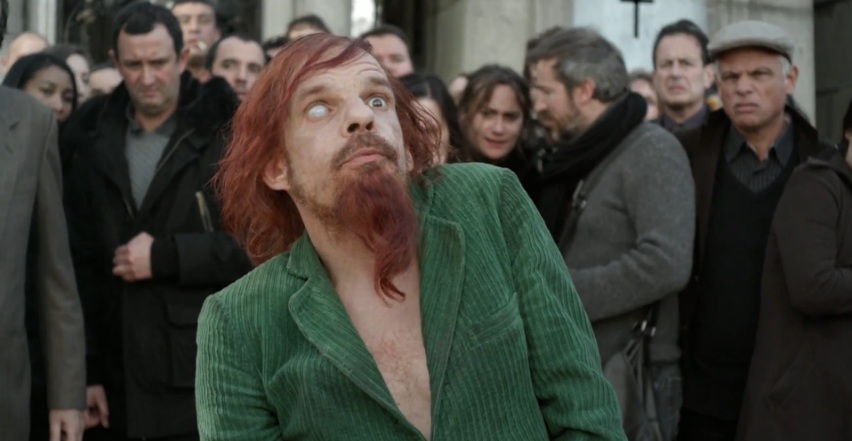 The Holy Motors Experience?
The Holy Motors Experience?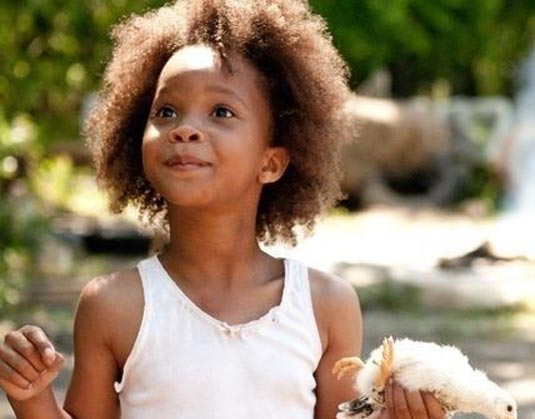 The winner of our best picture prize was… *drum roll* … Leos’ Carax’s Holy Motors. It was a tight race all the way and the runners-up finally tied, both falling short of the French enigma by just a few points. The Master was the biggest favorite across the board, finishing in the top three in almost every category it was eligible for. Another favourite was Benh Zeitlin’s vibrant bayou-set drama, Beasts of the Southern Wild, though it doesn’t show up in any of the main categories here. Consensus titles naturally take over most of the awards, though you’d be surprised to know there was strong support for less expected films like The Kid with a Bike and Take This Waltz.
The winner of our best picture prize was… *drum roll* … Leos’ Carax’s Holy Motors. It was a tight race all the way and the runners-up finally tied, both falling short of the French enigma by just a few points. The Master was the biggest favorite across the board, finishing in the top three in almost every category it was eligible for. Another favourite was Benh Zeitlin’s vibrant bayou-set drama, Beasts of the Southern Wild, though it doesn’t show up in any of the main categories here. Consensus titles naturally take over most of the awards, though you’d be surprised to know there was strong support for less expected films like The Kid with a Bike and Take This Waltz.


